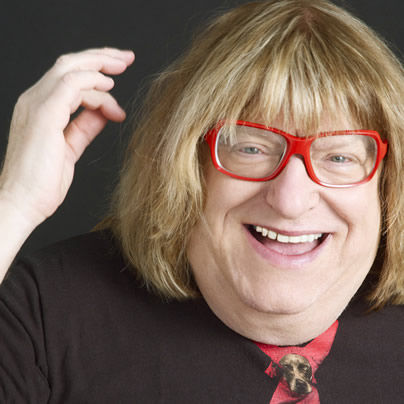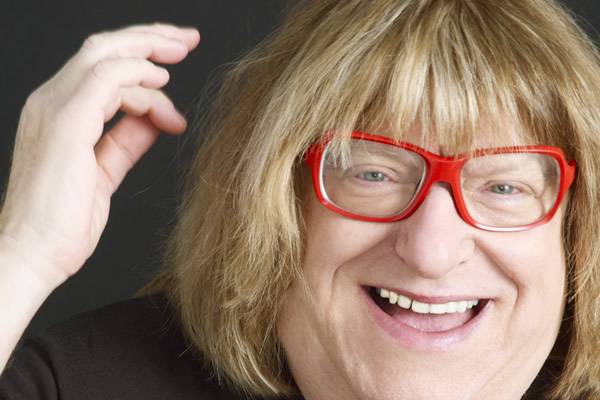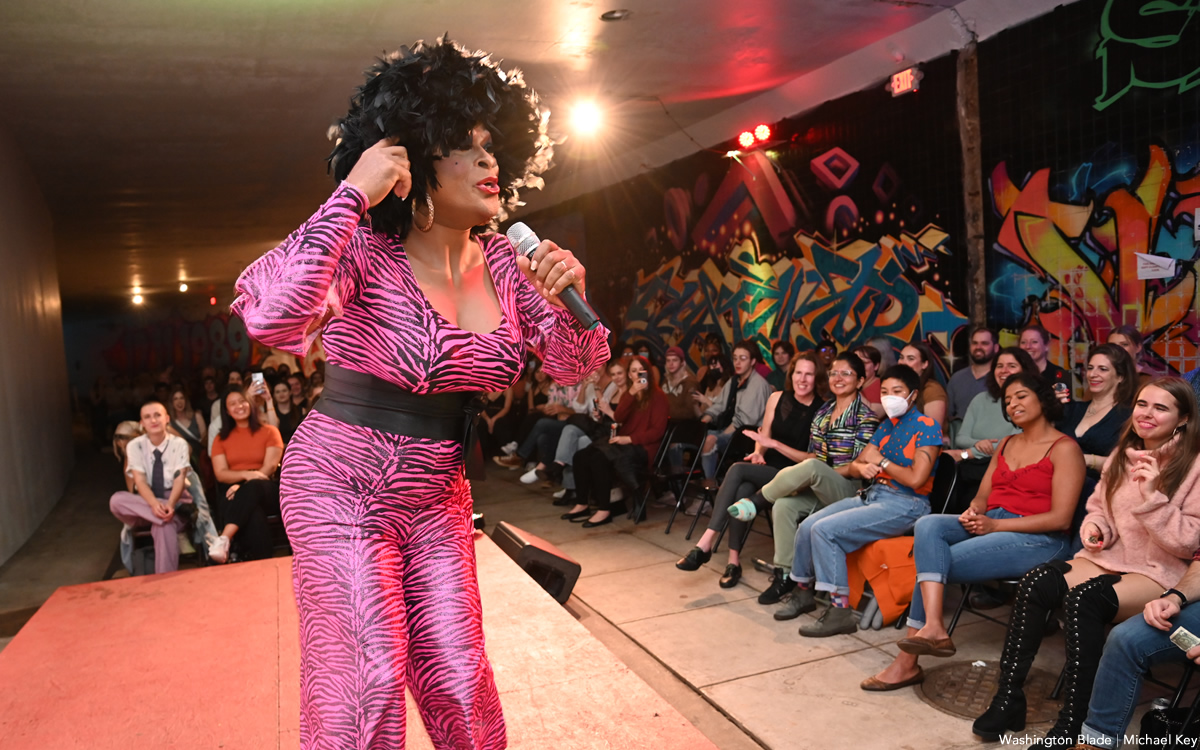Arts & Entertainment
Dishing with Bruce
Hollywood funny guy on ‘70s drugs, the Oscars and hanging out with Robert Reed


Bruce Vilanch is in town to honor Carol Burnett at the Kennedy Center this weekend. He’s at Cobalt Friday night. (Photo by Rick Stockwell)
Bruce Vilanch — perhaps America’s favorite gay funny man — will be at Cobalt Friday night to greet fans. Famous for his Oscar jokes and appearances on “Hollywood Squares,” we caught up with him by phone two weeks ago where he was in a jovial mood, cracking jokes the whole time. His comments have been slightly edited for length.
WASHINGTON BLADE: Is it harder to make people laugh in the Internet age? How do you still make people laugh when they’ve seen it all?
BRUCE VILANCH: Well yeah, it’s harder to come up with original stuff because someone will write something, post it online then it’s out there before it’s even been performed. It’s like instantaneous. So it’s harder now to surprise people. But on the other hand, people are so much more connected now that they get every joke. Things are in touch almost to a sickening amount so that by the time you try something live, they get every reference because they’ve had a chance to be exposed to it. I guess there are plusses and minuses. I think also the chances of offending somebody have quadrupled.
BLADE: Why?
VILANCH: Everybody feels their opinion is valid and they have a place to post it publicly now. It used to be reserved for the people who had the platforms but now anybody can post their opinion.
BLADE: Is it hard to keep doing it? I think many of us outside of Hollywood imagine it must be constant pressure.
VILANCH: Well, you have to keep working at it. Fortunately as a writer, you can generate your own work. Actors have a hard time doing that. But then you have to go off and try to sell it. You can never afford to be asleep at the switch, unlike the people who run trains in Chicago. But thankfully there are no real term limits on these kinds of things. I guess at a certain point you start fighting a creeping ageism but if you’re distinctive enough, people don’t mind. Everybody loved Rodney Dangerfield and now he’s up there with God. God must be happier now.
BLADE: What brings you to our fair city?
VILANCH: I’ll be in town to be part of the Mark Twain Prize ceremony to Carol Burnett at the Kennedy Center (on Sunday), so while I’m here I’ll be making a little appearance at Cobalt as well.
BLADE: Will you be performing at Cobalt?
VILANCH: Not really a performance. More of a meet-and-greet and maybe answer some questions. And getting some phone numbers hopefully. Facebook is unreliable. You have to save them in your phone.
BLADE: Did you do any writing for Carol’s show back in the ‘70s?
VILANCH: No, I never did. She and her husband at the time believed in hiring writing teams. They seemed to like what they were getting with the contracts for a writing team and I didn’t have a writing partner. I had a sex partner, but that’s not what they were interested in. Later I worked with her on some specials and some personal appearances but not anything where she was in character.
BLADE: What was the show she did in the early ‘90s on NBC?
VILANCH: Oh yeah, “Carol & Company” I think. It did fairly well I think, but she stopped because she said it was like shooting a new pilot every week. Each episode was like a one-act play and that’s very hard to pull off on a weekly basis. I think she had some success with it but she just didn’t want to work that hard all the time.
BLADE: The Screen Actors Guild just came out with a study on actors and anti-gay discrimination. It seemed a little surprising considering how many power gays we have in Hollywood like Ellen and Neil Patrick Harris.
VILANCH: Who look remarkably similar, don’t they?
BLADE: We see lots of LGBT actors, but is it still squeamish in the boardrooms? What’s been your experience?
VILANCH: I think it’s a lot less squeamish than it was. I’m not really in the boardrooms, so I can’t really comment on that. It’s just like every place generally. We’ve become part of the mainstream. We’re probably getting very close to having a big male action or romantic star who’s gay. I don’t know who it would be. Maybe if Cheyenne Jackson got a big role or something we could test the long-held theory that they won’t buy you in a big action or romantic role if you’re gay. It’s happening more in pro sports. … Maybe someday we’ll have somebody say, “Yes, I’m James Bond. And I enjoy a good old fudgepacking.”
BLADE: Of course we have to talk about the Oscars. The host job seems notoriously brutal. The critics seem like they can’t wait to hate anybody new who tries it. Yet you always seem to come out smelling like a rose. Is it because you’re not out there on stage?
VILANCH: I’m flattered you think that but obviously you don’t read the same blogs I do. I get slammed all the time. I get slammed for Oscar shows I didn’t even write, that I had nothing to do with. People are always saying, “Why don’t they get rid of that guy?” I’m like, “Well, if you stayed to read the credits, you’d see,” but I guess nobody is awake to read the credits at 4 or 5 in the morning so I really can’t blame them. But that’s the hallmark of the Internet really. People cutting loose with ignorant opinions, so I continue to get blamed. I feel like I wake up covered in mud. Even when the show’s a hit, or I win an Emmy, people are saying, “Oh, it was boring, it was horrible.” I remember the producer of the Oscar show used to have two framed reviews on his office wall. One was a rave from the New York Times and one was a slam from the Los Angeles Times. They were as extreme as they could be and they were about the same show. So you really never win, except, I guess, when you do.
BLADE: But why are people so tough on the host? I remember watching David Letterman and Jon Stewart do it and laughing throughout the night. They may not have been the best ever, but they didn’t seem to me to be as bad as everybody thought they
VILANCH: Well, just by the sheer numbers you realize that a lot of people who watch must be unfamiliar with these hosts beforehand. Suddenly you’re up there in front of 35 million people, so everybody has an opinion. And they’re working within a certain limitation, so they can’t just do what they do on their own shows. And sometimes things play differently at home but didn’t play that well in the house. Sometimes it’s just the wrong energy. With Letterman I think it was kind of like, “OK, we don’t need TV boy here coming out and making fun of our names.” But then he used that as a running gag on his own show forever. … And a lot of these people who watch aren’t even people who go to the movies. It’s like people watching the Super Bowl who never watch football. It’s just kind of a cultural experience people feel they have to share in. It’s like the people going out on New Year’s Eve and that’s the only time they go out. So you’re not always working with the best possible audience to be honest.
BLADE: You wrote for the “Brady Bunch Hour.” Was Robert Reed out to you?
VILANCH: Oh sure. He lived with his mother but we would go out to clubs together. He was kind of into rough trade. But he was afraid to go anywhere much because he was afraid of being seen. So we would arrange to sit back in some dark corner. It was very pre-Stonewall. I mean, it wasn’t technically pre-Stonewall, but it still felt like pre-Stonewall.
BLADE: What was he like? Was he fun to hang out with?
VILANCH: Well, he was so deeply closeted it was hard to get him to let loose and just have fun. He was always very nervous about it. A lot of these people living this kind of big secret tend to be pretty tightly wound because so much is at stake. But yeah, once you broke through all that, he was fun. I was always out and I was this big flamboyant comedy type and he was comfortable with me. I kind of helped him lubricate his way so to speak (laughs).
BLADE: For all the great stuff you’ve done, you’ve also been involved in some of the most ignominious bombs in all of pop culture history with stuff like “The Brady Bunch Hour” and the “Star Wars Holiday Special.” I hope you’re not offended by this question, but did you have any sense at the time, these would attain such train wreck
VILANCH: Well, you always go into something thinking it’s a good idea but you have to remember, this was the ‘70s and so we were all a bit chemically altered at the time. You have to also realize, like with the Brady show, this type of variety show concept was still popular at the time. We didn’t realize it was breathing its last. It’s the kind of thing that could have been really terrific if any of them could sing and dance. I mean they did a little on their original show but it became clear pretty quickly when we tried this sort of hybrid thing, that it wasn’t going to work. It’s still fun to roll the dice. Now had you told me if would have become like this kind of cult thing, that would have surprised me at the time.
BLADE: Obviously when you’re writing an awards show, you have to know the material that’s nominated. How do you have time to watch whole seasons of TV shows and all the Oscar nominees?
VILANCH: Well, it’s a lot easier than it used to be because they just send you screeners now and you can sit at home. It sure beats having to go to screenings, which were horrible experiences. No popcorn. But I go to the movies anyway. To get paid for it just tickles me to no end.
BLADE: Obviously most of us are not Hollywood insiders, so something I’m always curious to ask people who are is this: Does the cream always rise or have you seen true cases of highly talented people who just never got the right break? Sometimes it feels surprising to watch some of the stuff that does get a green light.
VILANCH: Have I seen people fall through the cracks, yes I have. There’s a feeling that there’s a kind of natural selection at work and it’s survival of the fittest. You kind of have to have the right combination too. It’s not always enough to just have the talent. You have to have the talent and the ambition and the kind of personality that allows you to hang in there long enough and have a thick hide so that you can get through life with all that rejection. So yes, there have been lots of people who didn’t have just that right combination. Maybe there were too dependent on something or they just didn’t have the oomph to push themselves through. With others, the talent seems to rise briefly because they get lucky but the ones who really last really do have unbelievable stamina and manage to break through all the other stuff. It sounds terribly dry, but it’s true.
BLADE: Where do you live?
VILANCH: In West Hollywood. I was up in the Hills for 28 years, but now I have a fabulous loft right on the boulevard. I stand out on my balcony like Eva Peron for the AIDS Walk and Pride and Halloween. And now I can stagger home.
BLADE: Do you hang out at gay bars in West Hollywood?
VILANCH: Yeah, some. Usually the reason you go out to a bar is to meet people who don’t answer your job description. But now there’s Grindr and that stuff, so you don’t have to go out as much.
BLADE: Some of the stuff they try for the Oscars seems a little head scratching at times. Like one year, they handed out some categories down in the aisles. Another year they had all the nominees come up on stage. Do you have any say in those kinds of decisions?
VILANCH: Um, no. Listen, at the time that kind of stuff is usually a response to some criticism that’s come up. Like that year, somebody had said, “Gee, how can we save some time here?” All those technical awards, the people are sitting in the back and it takes them so long to get to the stage. Somebody thought maybe having some of that done in the aisle would save some time. That was the perceived solution, but then everybody thought it made them seem like second-class citizens. There’s a little bit of reinventing the wheel every year but with a lot of it, there’s not a whole lot you can do. And the networks aren’t really upset with the long running time, because that just allows them to sell more ads so even when it’s absurdly long, they’re still pretty happy. I think one year they added like three or four honorary awards and that ended up adding like 45 minutes to the show and the network said, “OK, guys, this is a little ridiculous.” But one thing that’s worked is to hand some of those technical awards out at its own separate function, then just show highlights as a clip package and that saved a lot of time. The innovation I really liked the most was when Bill Condon had previous winners come out and salute the nominees individually. Then they said, “Oh it was too long,” so they only did it in two categories the next eyar and it didn’t have the same impact at all. I thought it was a fabulous innovation but the only problem was after awhile you would run out of previous winners. You only get one each year in each category.
BLADE: Well, you could just keep having Luise Rainer (age 103) come out every year to do it, God bless her. She’s been great about coming back for the milestones.
VILANCH: Yes, wasn’t that great? And one year Olivia de Havilland flew in from Paris, that was just great too.
BLADE: What’s one thing you miss about ‘70s-era Hollywood and one thing you don’t miss?
VILANCH: Well I guess I miss the drugs. It was the ‘70s so there was all this hedonism so you had that and the porno mustaches, which I love. But on the other hand, to be honest, I don’t miss the drugs. I really don’t miss everybody being loaded all the time and they really were. It was probably the first time there was really this relentless
VILANCH: Um, no. Listen, at the time that kind of stuff is usually a desire to be young and that really hasn’t gone away but it was hysterical then when I was young. People would be wearing these flowered shirts with love beads and just trying very hard to be hip when really they were all barracudas. They did make us laugh.
BLADE: For all of us gays who love Carol, but will never get to schmooze with her, please give her our regards.
VILANCH: (laughs) OK.
Nightlife
Ed Bailey brings Secret Garden to Project GLOW festival
An LGBTQ-inclusive dance space at RFK this weekend

When does a garden GLOW? When it’s run by famed local gay DJ Ed Bailey.
This weekend, music festival Project GLOW at RFK Festival Grounds will feature Bailey’s brainchild the Secret Garden, a unique space just for the LGBTQ community that he launched in 2023.
While Project GLOW, running April 27-28, is a stage for massive electronic DJ sets in a large outdoor space, Secret Garden is more intimate, though no less adrenaline-forward. He’s bringing the nightclub to the festival. The garden is a dance area that complements the larger stages, but also stands on its own as a draw for festival-goers. Its focus is on DJs that have a presence and following in the LGBTQ audience world.
“The Secret Garden is a showcase for what LGBTQ nightlife, and nightclubs in general, are all about,” he says. “True club DJs playing club music for people that want to dance in a fun environment that is high energy and low stress. It’s the cool party inside the bigger party.”
Project GLOW launched in 2022. Bailey connected with the operators after the first event, and they discussed Bailey curating his own space for 2023. “They were very clear that they wanted me to lean into the vibrant LGBTQ nightlife of D.C. and allow that community to be very visibly a part of this area.”
Last year, club icon Kevin Aviance headlined the Secret Garden. The GLOW festival organizers loved the its energy from last year, and so asked Bailey to bring it back again, with an entire year to plan.
This year, Bailey says, he is “bringing in more D.C. nightlife legends.” Among those are DJ Sedrick, “a DJ and entertainer legend. He was a pivotal part of Tracks nightclub and is such a dynamic force of entertainment,” says Bailey. “I am excited for a whole new audience to be able to experience his very special brand of DJing!”
Also, this year brings in Illustrious Blacks, a worldwide DJ duo with roots in D.C.; and “house music legends” DJs Derrick Carter and DJ Spen.
Bailey is focusing on D.C.’s local talent, with a lineup including Diyanna Monet, Strikestone!, Dvonne, Baronhawk Poitier, THABLACKGOD, Get Face, Franxx, Baby Weight, and Flower Factory DJs KS, Joann Fabrixx, and PWRPUFF.
Secret Garden also brings in performers who meld music with dance, theater, and audience interactions for a multi-sensory experience.
Bailey is an owner of Trade and Number Nine, and was previously an owner of Town Danceboutique. Over the last 35 years, Bailey owned and operated more than 10 bars and clubs in D.C. He has an impressive resume, too. Since starting in 1987, he’s DJ’d across the world for parties and nightclubs large and intimate. He says that he opened “in concert for Kylie Minogue, DJed with Junior Vasquez, played giant 10,000-person events, and small underground parties.” He’s also held residencies at clubs in Atlanta, Miami, and here in D.C. at Tracks, Nation, and Town.
With Secret Garden, Bailey and GLOW aim to bring queer performers into the space not just for LGBTQ audiences, but for the entire music community to meet, learn about, and enjoy. While they might enjoy fandom among queer nightlife, this Garden is a platform for them to meet the entirety of GLOW festival goers.
Weekend-long Project GLOW brings in headliners and artists from EDM and electronic music, with big names like ILLENIUM, Zedd, and Rezz. In all, more than 50 artists will take the three stages at the third edition of Project GLOW, presented by Insomniac (Electric Daisy Carnival) and Club Glow (Echostage, Soundcheck).
Out & About
Washington Improv Theatre hosts ‘The Queeries’
Event to celebrate queer DMV talent and pop culture camp

The Washington Improv Theatre, along with the Mayor’s Office of LGBTQ Affairs and the Gay Men’s Chorus of Washington DC, will team up to host “The Queeries!” on Friday, April 26 at 9:30 p.m. at Studio Theatre.
The event will celebrate Queer DMV talent and pop culture camp. With a mixture of audience-submitted nominations and blatantly undemocratically declared winners, “The Queeries!” mimics LGBTQ life itself: unfair, but far more fun than the alternative.
The event will be co-hosted by Birdie and Butchie, who have invited some of their favorite bent winos, D.C. “D-listers,” former Senate staffers, and other stars to sashay down the lavender carpet for the selfie-strewn party of the year.
Tickets are just $15 and can be purchased on WITV’s website.
Out & About
Drag Underground returns
Indiana Bones, Bombalicious Eklaver, Shi-Queeta Lee, Cake Pop! to perform

Dupont Underground and the Washington Blade have teamed up to host “Drag Underground” on Friday, April 26 at 7:30 p.m. at Dupont Underground.
Performers include Indiana Bones, Bombalicious Eklaver, Shi-Queeta Lee and Cake Pop.
Tickets start at $15 and can be purchased on Eventbrite.
-

 State Department3 days ago
State Department3 days agoState Department releases annual human rights report
-

 South America1 day ago
South America1 day agoArgentina government dismisses transgender public sector employees
-

 Maryland5 days ago
Maryland5 days agoJoe Vogel campaign holds ‘Big Gay Canvass Kickoff’
-

 District of Columbia1 day ago
District of Columbia1 day agoCatching up with the asexuals and aromantics of D.C.










